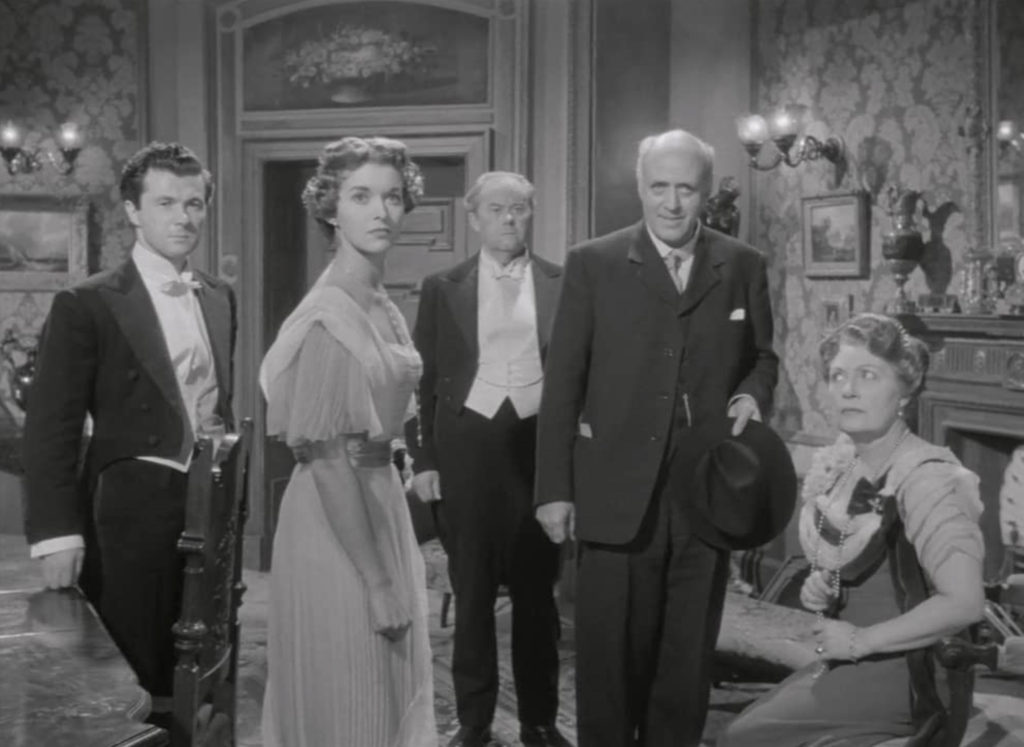I’m a sucker for classic British films: black-and-white dramas from the ’40s and ’50s, with top-notch actors, sharp directors, and often a thorny moral dilemma.
One such gem, “An Inspector Calls” (1954), is based on the play by J.B. Priestley, and stars Alistair Sim (of Scrooge fame) as an otherworldly examiner of conscience.
You can stream it for free on Internet Archive or the Kanopy feature of your LA Public Library card.
The credits roll over a sumptuously laid dinner table. The Birling family is celebrating the engagement of their daughter Sheila to Gerald Croft, an upper-crust scion who is marrying ever-so-slightly down. Not to worry: Arthur Birling, the insufferably smug factory-owning patriarch, is up for a knighthood.
The formidable Mrs. Birling keeps watch over her brood with an eagle eye. “You’ll get used to being alone a good bit of the time, dear,” she counsels Sheila, apropos of what promises to be Gerald’s endless business travels. “I did.”
Eric, the perpetually tipsy Birling son, is belittled by his father and treated like a baby by his mother. He alone has trouble getting into the spirit of the occasion, making mordant asides and nodding off over the liqueurs.
Just as Mr. Birling proposes a toast, a large, urbane figure appears — materializes, actually. He’s not come through the front door. And who has let him in?
He introduces himself as Inspector Poole and announces that a young woman named Eva Smith has been brought to the infirmary that afternoon and, having ingested a strong antiseptic, died.
Was it suicide? they all ask. The inspector — who’s had access to Eva’s diaries and journals — declines to answer and instead proposes showing the dead woman’s photograph to each member of the family in turn.
He starts with Mr. Birling. A couple of years ago, turns out, Eva had been employed as a shop girl at his factory. Her crime, we learn in flashback, was to have joined a delegation of sister workers and asked Birling for a raise. Not my problem, he’d blustered, then had her fired.
“You seem to forget that we’re respectable citizens,” Gerald protests to this line of questioning, “not criminals.”
Poole, imperturbable, murmurs that he’s sometimes hard-pressed to tell the difference.
Eva was next employed at a women’s clothing shop that Sheila, after being shown the photo, remembers with dawning horror she visited a year or so ago. “I was in a filthy temper and I was determined to get my way over that hat.” She’d reported Eva’s “abominable rudeness” — basically, because Eva the girl had smiled — and once again, gotten her fired.
Each member of the family is shown to have contributed to Eva’s downfall. Gerald took her as his mistress for a time, then dumped her for Sheila.
Homeless, penniless, and as it turns out, heavy with child, Eva had appealed to the local charity organization, of which Mrs. Birling is the chair. She’d refused to divulge the name of the child’s father, nor to beg him for money. In the face of such “impertinence,” Mrs. Birling, outraged, had categorically denied Eva’s request for help.
“It was her own fault,” she continues to insist in the face of Poole’s penetrating gaze. “And the young man should be publicly exposed and dealt with severely.”
The young man is, of course, none other than Eric who, bumbling and drunk, had charmed his way into Eva’s flat and heart, and impregnated her.
The senior Birlings are incorrigible. Money and status are their gods.
Birling sputters, “That all happened more than two years ago. … Good heavens, man, I can’t accept any responsibility. If we were all responsible for things that happened to people we’d had anything to do with, it’d be very awkward, wouldn’t it?”
“Very awkward,” Poole agrees dryly.
Sheila, by contrast, is deeply contrite. “It’s not only Eva Smith, Father. It’s all the Eva Smiths. It’s the things we do to people without realizing it. Only for once we’ve seen the consequences.”
Eric, too, is shaken. “I can change. Stop drinking.”
Meanwhile out for a walk, Gerald runs into the local constable and learns that there is no Inspector Poole on the force. A fake! And upon calling the infirmary, he learns there hasn’t been a suicide for months.
Arthur Birling crows, “Makes all the difference in the world whether we said it in private or it becomes a public scandal.”
“The girl’s dead and we all helped to kill her,” Eric rejoins bitterly. “That’s all that matters.”
I won’t spoil the ending. The film is in one way a scathing critique of privilege, class, and bourgeois hypocrisy. It also opens the possibility of hope in the post-war Britain younger generation.
Deeper still, it’s a meditation upon the many offenses we commit that are not punishable by law but are profound offenses against the law of love. How many times have I taken out my own fear or frustration or hurt on someone who I thought in the moment “didn’t matter?” How often have I struck back in my heart against someone who had the “impertinence” to question my values? How different are any of us, really, than the millions of people who are in prison?
Long after the credits rolled, I was still thinking: What might I have to answer for if Inspector Poole knocked on my door?

